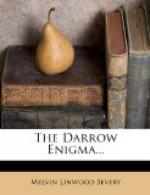You will understand, of course, that I did not learn all this at our first interview. Maitland did not take me into his confidence until we had had a conference at his laboratory devoted entirely to scientific speculations. On this occasion he surprised me not a little by turning to me suddenly and saying: “Some of the grandest sacrifices the world has ever known, if one may judge by the fortitude they require, and the pain they cause, have occurred in the laboratory.” I looked at him inquiringly, and he continued: “When a man, simply for the great love of truth that is in him, has given his life to the solution of some problem, and has at last arrived, after years of closest application, at some magnificent generalisation—when he has, perhaps, published his conclusions, and received the grateful homage of all lovers of truth, his life has, indeed, borne fruit. Of him may it then be justly said that his
“’. . . life hath
blossomed downward like
The purple bell-flower.’
But suddenly, in the privacy of his laboratory, a single fact arises from the test-tube in his trembling hand and confronts him! His brain reels; the glass torment falls upon the floor, and shatters into countless pieces, but he is not conscious of it, for he feels it thrust through his heart. When he recovers from the first shock, he can only ejaculate: ‘Is it possible?’ After a little he is able to reason. ‘I was fatigued,’ he says; ’perhaps my senses erred. I can repeat the experiment again, and be sure. But if it overthrow those conclusions for which I have given my life?’ he gasps. ’My generalisation is firmly established in the minds of all—all but myself—no one will ever chance upon this particular experiment, and it may not disprove my theory after all; better, much better, that the floor there keep the secret of it all both from me and from others!’ But even as he says this to himself he has taken a new tube from the rack and crawled—ten years older for that last ten minutes—to his chemical case. The life-long habit of truth is so strong in him that self-interest cannot submerge it. He repeats the experiment, and confirms his fears. The battle between his life and a few drops of liquid in a test-tube has been mercilessly fought, and he has lost! The elasticity of the man is gone forever, and the only indication the world ever receives of this terrible conflict between a human soul and its destiny is some half a dozen lines in Nature, giving the experiment and stating that it utterly refutes its author’s previous conclusions. Half a dozen lines—the epitaph of a dead, though unburied, life!”




